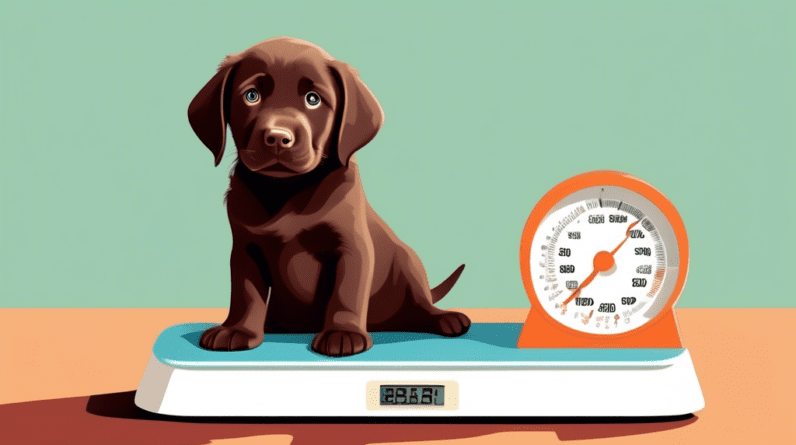
How Much Should a Labrador Retriever Weigh?
Labrador Retrievers are beloved companions known for their friendly nature, intelligence, and versatility. As with any breed, maintaining a healthy weight is crucial for their overall well-being and longevity. But how much should a Labrador Retriever actually weigh? In this comprehensive guide, we’ll delve into the factors influencing their weight, provide detailed weight ranges for adult Labs, and offer valuable insights into keeping your furry friend at a healthy weight.
Understanding Labrador Retriever Weight Ranges
Determining the ideal weight for a Labrador Retriever isn’t as simple as looking at a single number. Several factors come into play, including:
1. Sex
Male Labrador Retrievers are typically larger than their female counterparts. On average, you can expect a weight difference of about 5-10 pounds between the sexes.
2. Genetics
Just like in humans, genetics play a significant role in a Labrador’s size and weight. Some Labs may be genetically predisposed to being slightly larger or smaller than average.
3. Age
Puppies grow rapidly, and their weight can fluctuate significantly during their first year. It’s essential to monitor their growth closely and consult with your veterinarian to ensure they’re on track.
4. Diet and Exercise
Perhaps the most significant factor influencing a Labrador’s weight is their diet and exercise regimen. Providing a balanced diet and ensuring adequate physical activity is crucial for maintaining a healthy weight.
Average Adult Labrador Retriever Weight
As a general guideline, here’s an average weight range for adult Labrador Retrievers:
- Male Labrador Retrievers: 65-80 pounds (29-36 kg)
- Female Labrador Retrievers: 55-70 pounds (25-32 kg)
It’s important to note that these are just averages. Some healthy adult Labs may fall slightly outside these ranges, and that’s perfectly normal.
Recognizing a Healthy Weight in Your Labrador Retriever
While weight ranges provide a helpful starting point, it’s essential to assess your Labrador’s overall body condition to determine if they’re at a healthy weight. Here’s what to look for:
1. Body Condition Score
Veterinarians often use a body condition score (BCS) to evaluate a dog’s weight. The BCS typically ranges from 1 to 9, with 1 being emaciated and 9 being obese. A healthy weight for a Labrador Retriever falls within the 4-5 range.
2. Visual Assessment
You should be able to feel your Labrador’s ribs easily without seeing them prominently. Their waist should have a visible tuck when viewed from above, and their abdomen should slope upward from the rib cage.
3. Energy Levels
A healthy Labrador should have plenty of energy for walks, playtime, and other activities. If you notice a significant decrease in their energy levels, it could indicate a weight issue.
Maintaining a Healthy Weight for Your Labrador Retriever
Keeping your Labrador Retriever at a healthy weight is an ongoing commitment that involves providing a balanced diet, ensuring adequate exercise, and monitoring their weight regularly.
1. Diet
Feeding your Labrador a high-quality, balanced diet is crucial for their overall health and weight management. Choose a food that’s specifically formulated for their life stage (puppy, adult, senior) and activity level.
2. Portion Control
Overfeeding is a common cause of obesity in Labrador Retrievers. Follow the feeding guidelines on your chosen food, and consider using a measuring cup to ensure accurate portions.
3. Exercise
Labrador Retrievers are an active breed that requires regular exercise to maintain a healthy weight and prevent boredom. Aim for at least 30 minutes of moderate-intensity exercise most days of the week.
4. Regular Vet Checkups
Regular veterinary checkups are essential for monitoring your Labrador’s overall health, including their weight. Your veterinarian can provide personalized guidance on maintaining a healthy weight for your furry friend.
5. Treat Wisely
While treats can be a valuable training tool and a way to show your Labrador some love, it’s crucial to give them in moderation. Choose healthy treat options and factor them into their daily calorie intake.
The Importance of a Healthy Weight
Maintaining a healthy weight is essential for your Labrador Retriever’s overall health and well-being. Obesity can lead to several health problems, including:
- Joint problems (hip dysplasia, arthritis)
- Heart disease
- Diabetes
- Respiratory problems
- Reduced lifespan
By following the guidelines outlined in this article, you can help your Labrador Retriever maintain a healthy weight and enjoy a long, happy, and active life.
Conclusion
The ideal weight for a Labrador Retriever can vary based on several factors, including sex, genetics, age, and lifestyle. Understanding these factors and monitoring your furry friend’s body condition, energy levels, and overall health are crucial for ensuring they stay within a healthy weight range. By providing a balanced diet, ensuring adequate exercise, and scheduling regular veterinary checkups, you can help your beloved Labrador live a long, healthy, and fulfilling life.






